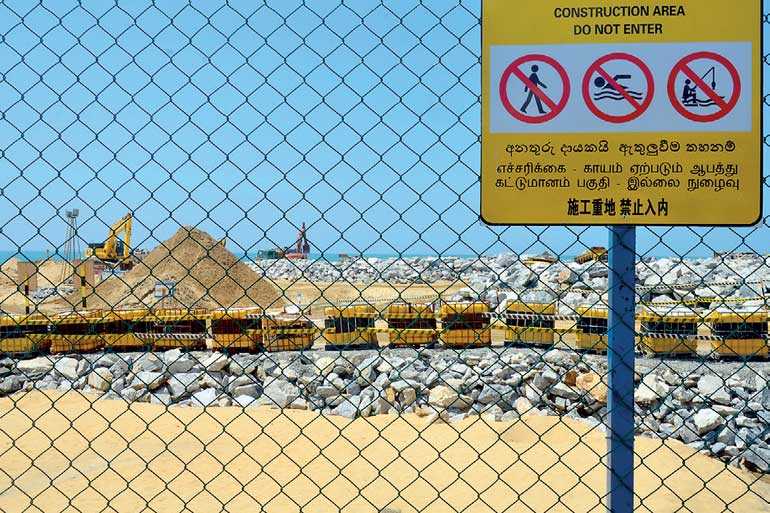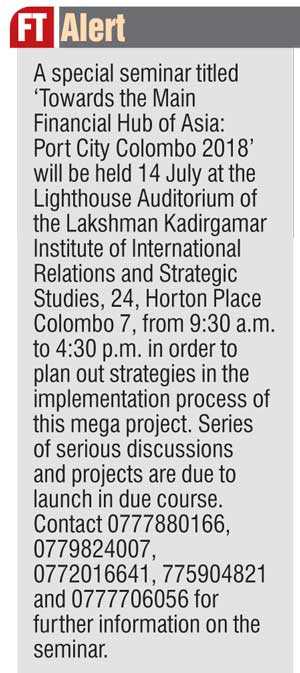Thursday Feb 19, 2026
Thursday Feb 19, 2026
Thursday, 12 July 2018 00:00 - - {{hitsCtrl.values.hits}}

It is now certain, cemented and unstoppable that Sri Lanka Port City is the future hub of business activities and foundation of the success of new Sri Lanka in the new world and business order, on par with world giants, exploiting the strategic geographical location as well as historical and traditional links with China and other business leaders.
Sri Lanka has many advantages over other counterparts of landfilling projects in the world, ideally situated in strategic and geographical manner in the Indian Ocean, with full of future potential. Despite concerns, it is our duty and mandate to complement the project in the best interest of Sri Lanka and the rest of the world, including neighbours and beneficiaries in the orbit.
It is with this in the agenda that the special seminar titled ‘Towards the Main Financial Hub of Asia’ is being organised on 14 July at the Lighthouse Auditorium in order to plan out strategies in the implementation process of this mega project. Series of serious discussions and projects are due to launch in due course.
Second largest world economic giant
China is the second largest world economic giant and an emerging economic superpower helping the members of the world family, with no ulterior or any political considerations as many economic and political giants with geographical considerations and interests in small and neighbouring nations. It has 1.379 billion with GDP 112.2 trillion (in dollars) to feed, compared to the immediate neighbouring economic competitor – India – with a population of 1.324 billion with GDP 2,264 million. 
The Chinese are historically and traditionally traders who travelled worldwide as merchants and cultural and business ambassadors, with no plans or schemes of controlling other states or extracting wealth as the Western colonial masters who colonised other states for exploitation of wealth and resources disturbing the religious and cultural values of its inhibitions.
The Belt and Road Initiative (BRI) is initiated and launched setting an international cooperation platform for the global public good following the traditional silk route for the 21st century with the rest of the world, with initial and substantial funding from China with the vision of President Xi Jinping as the leading personality on the multi-billion operation in which five trillion global trade passes through the South China Sea.
China-Sri Lanka relations run back into centuries with religious, cultural and close friendships, uninterrupted despite the asymmetrical size and distance, recorded in historic and religious documents by traders and Buddhist monks who voyaged in hundreds exchanging knowledge and customs with close bonds based on religious principles and teachings of Lord Buddha.
BRI is initiated for global public good forming an International Cooperation Initiative (ICP) platform. Sri Lanka is one of the first few countries to receive a loan of seven billion with 1.8 million (all in dollars) in 2015 with close relations maintained between the two friendly nations. The ICP initiative is the largest platform on economic growth connecting China, Persian Gulf, Mediterranean, and the Indian Ocean at the cost of 900 billion, for an era of global world order costing eight trillion for infrastructure benefiting 92 countries, which is 65% of global population, benefitting these countries at a cost of 9500 billion. India is concerned about the Chinese presence in Doklam (Bhutan, Nepal, Sri Lanka, Maldives Islands, Myanmar) and other small states in the Indian Ocean and on the Silk Belt maintaining economic bonds when the Chinese Leader has changed the constitution to a lifetime presidency.
Connectivity through modernised Silk Route
One of the main aims of the initiative is connectivity and cooperation between Euro Asian countries for the economic benefits of all, targeting the entire world economy to be on the doorstep of Asia – the booming and upcoming economic zone. The Silk Route will be transferred into a vibrant mega economic route reviving the traditional silk route that existed over thousands of years connecting the people’s countries and continents economically, socially and culturally.
China is the second largest world economy, trusted by the small nations as friendly, proven historically to lack ulterior hidden political agendas except trade, business and investment on long term plans. India with her regional supremacy mentality has antagonised many neighbours and small nations, being an important factor on the management of the foreign policy of small nations and more especially the neighbours, due to the cold war between the giants on the supremacy of the Indian Ocean coupled with economic and political competition.
It is time for us to manage diplomatically political and ideological differences, if any at all, and use the friendly relations and good offices of the Sri Lankan professionals abundantly available in Sri Lanka and worldwide for a coherent vibrant and Sri Lanka friendly Foreign and Trade Policy initiative on both political and economic fronts. It appears that there are constant disagreements on Indian and Chinese trade, foreign and policy on small states, with detrimental effects on the small nations sandwiched in between their trade and geopolitical war.
India is demanding a better foothold in Sri Lanka due to Chinese effective presence economic corporation; the new Belt Road Initiative will irk and worry India further planning closely with the common enemy for supremacy on trade and geo political power. In any event connectivity will help the countries in the belt, including India, and the success of the initiative will be for the best interest of many countries on the belt and the region, mostly benefiting Sri Lanka – a close friend and ally of China historically.
Hub diplomacy
China has two-way trade of 3.5 trillion, aiming to be a leader in the digital age having the digital giant Alibaba based in China, making use of world languages while uplifting Chinese language, is planning hub diplomacy, encouraging trade hubs on the proposed Silk Road with the new venture ‘One Road – One Belt’ initiative.
In the circumstances Hambantota-Magama Harbour is a win-win situation for centuries, for China to have a foothold in the most strategically important point on the sea route in Asia – Dubai, Singapore and Pakistan are developed hubs due to the strategic situation and manmade mega developments, out of which Hambantota-Magama is the hub leader, being the centre of the Indian Ocean and a main stopover in the traditional Silk Route, rejuvenated by the modern Belt Road Initiative by China, pumping trillions for development of 92 countries around the route.
Dubai, once a fish market with no oil (only 4% oil unlike rich Abu Dhabi), but with strategic sea and air routes, which the visionary leader exploited. In any event, the new Belt Road Initiative will be a boom on hub diplomacy and formation of new hubs along the silk route, with improved business for the surrounding nations as satellites of modern economic China initiative.
Foreign policy
Foreign policy of a nation is a pre-requisite for its development and prosperity. It has direct and impact on commerce and trade relations, between each member of the world family and the rest of the world, in the set of rules outlining the behaviour of a particular country. Sri Lanka has had excellent relations for thousands of years with the world; especially China moulded on religious and cultural values and developed on the traditional Silk Route, which is still continuing.
Rev. Faxian came to Sri Lanka in the 5th century with 200 monks and 256 Sri Lankan monks visited China in return, and there were subsequent visits continuously. Sri Lanka supported China in 1950 at the United Nations when she needed our help and Rubber Rice Agreement is a main milestone on SL-China relations. Though asymmetrical in size and economy the friendship was on equal grounds and both countries are friends in need which helped each other in international and UN deliberations. Let this be an eye-opener for India and the other countries close to the belt and in broader Asia to think Asian and come forward with similar innovative products and initiatives as Asians.
Contact 0777880166, 0779824007, 0772016641, 775904821 and 0777706056 for further information on the seminar on 14/7/2018 at Lighthouse Auditorium, 24, Horton Place Colombo 7 on ‘Towards the Main Financial Hub of Asia: Port City 2018’.
(The writer is a former Ambassador to UAE and Israel.)
References
(All by the writer.)